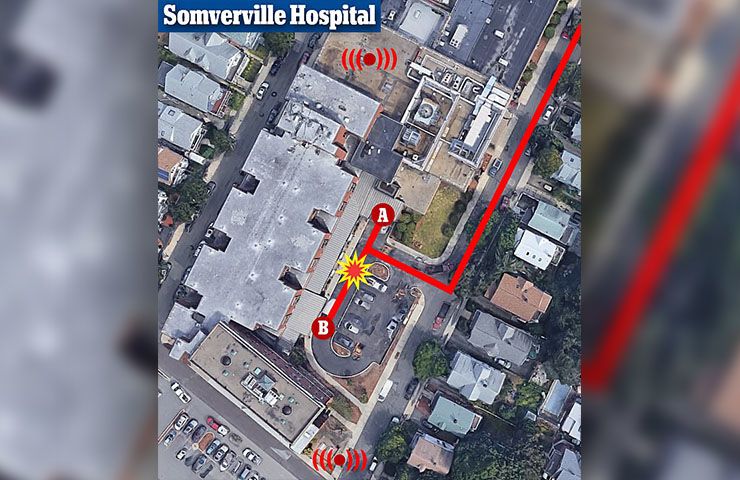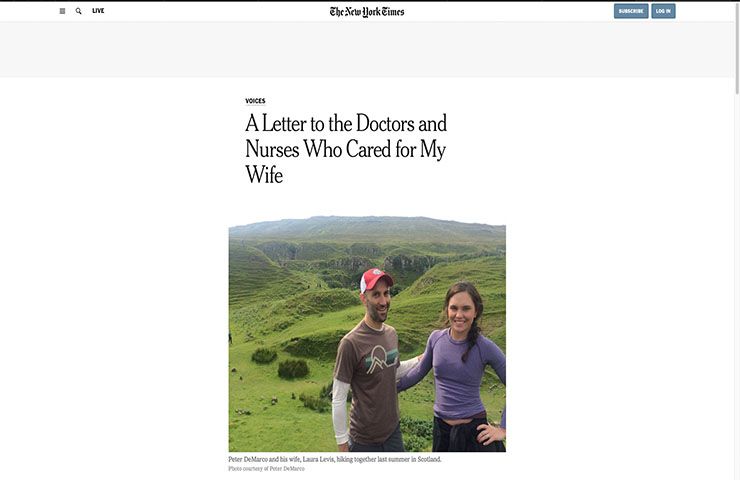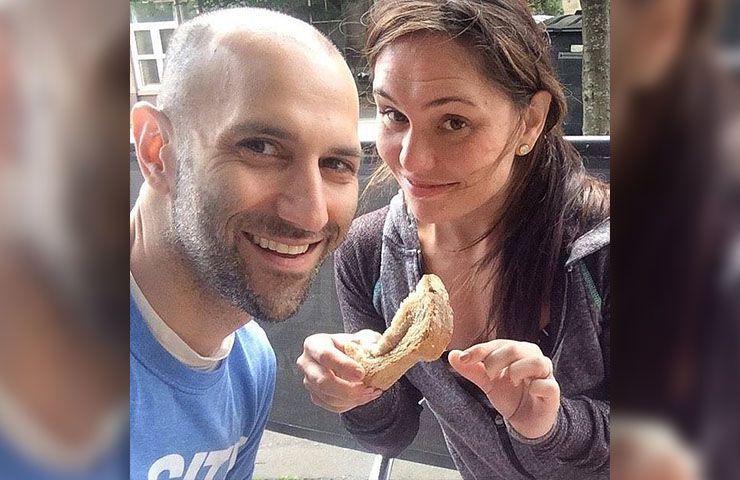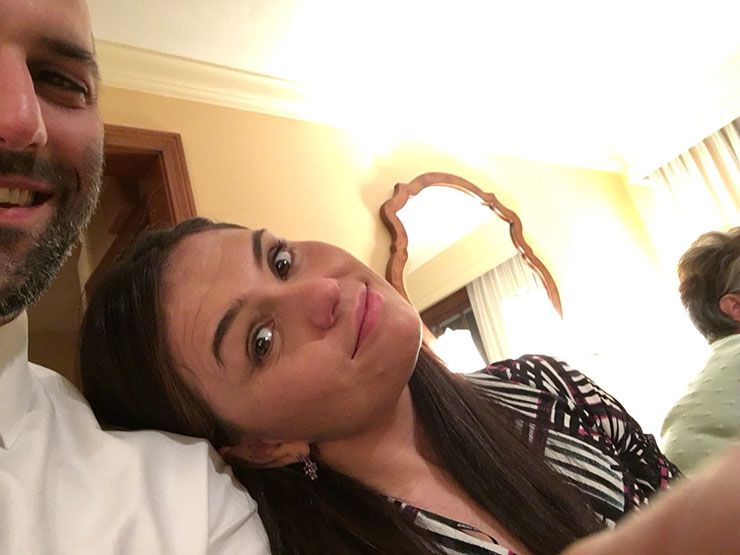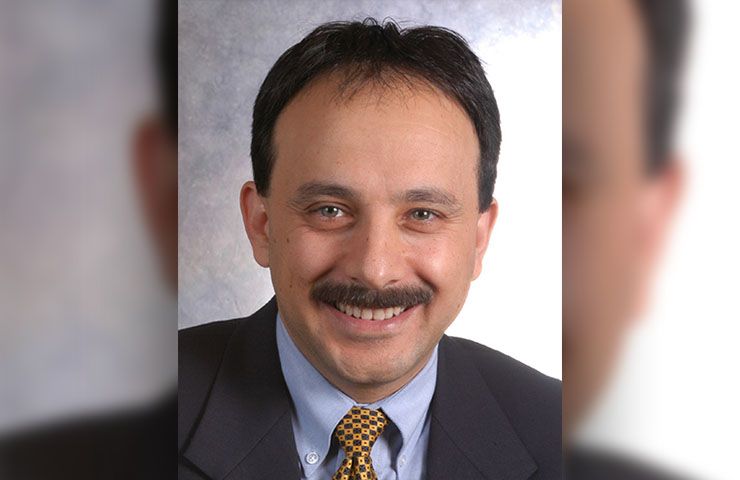When loving husband Peter DeMarco heard that his wife, 34-year-old Laura Levis, rushed to the emergency room of the nearest Massachusetts hospital on foot as she was in the midst of a serious asthma attack, he expected she would be seen right away and dealt with professionally.
DeMarco even penned a letter to the management of the CHA Somerville Hospital thanking them for treating his wife and him with dignity despite her tragic passing. But that was before a relative began looking into the events of that fateful night…
Young And Fit
Levis was young and also incredibly fit as she worked out daily despite suffering from asthma since birth. When she found herself having another asthma attack, she considered calling 911, but the hospital was within walking distance. With that in mind and the fact that her husband wasn’t home, Levis walked to the nearby hospital hoping to get immediate treatment for the serious asthma attack she was having.
Annual Fatalities
Around 3,500 people die every year in America from asthma attacks that aren’t dealt with in time, but those people are usually in a bad state of health and often overweight and unfit. Levis didn’t fit that bill at all but still became one of 250,000 Americans each year that die due to human errors made at hospitals – the very places that are supposed to save lives and not take them.
Long-Term Asthma
Patients who suffer from serious cases of long-term asthma need to make sure they manage and navigate their lives properly. Levis had dealt with her condition well for many years, but on this day in September, she realized her attack wasn’t going to abate, and her ventilator wasn’t solving the problem. Fortunately, the hospital was but a short walk away for Levis, and she was confident she could make it in time.
Amazing Health
Levis never let her asthma get in the way of her life, and she was an athlete who was considered well on top of her gain. DeMarco even said, according to a Mail Online report that Levis could bench press more than her own body-weight and was a competitive runner and weightlifter. But on this fateful night tragedy struck and some awful consequences led to many unanswered questions.
Which Door?
CCTV footage shows Levis arriving at the entrance to the emergency room at the hospital at around 4 a.m. She stopped in the driveway to decide which of the two entrances she was faced with looked the most likely to be open, and the one that led to the emergency room. She tried one door, but the sliding glass didn’t move when she approached. She made her way to the second door and almost made it.
Sitting Down
Levis was clearly in distress and gasping for air. Before she made it to the second entry point at the hospital, she sat down on a bench to try to get some air and breathe. She called 911 from the bench and tried to explain her predicament. “I’m at Somerville Hospital. I’m having an asthma attack. I’m dying,” she said to the 911 dispatcher. The regional dispatcher clarified her location then called the local Somerville police station.
Finding Laura
The regional dispatcher pinged back and forth between herself and the police station as they tried to triangulate Laura’s location from her cellphone signal. But this technology is outdated, and the pings suggested that Levis was either outside the hospital entrance or around the back of the building. But hospital staff failed to locate Levis before it was too late.
I’m Outside
DeMarco wrote about the tragic events of that night. “In the 911 tape, you hear Laura’s voice again. ‘I’m outside,’ she starts to say, before struggling to make another sound,” he wrote. It is 4:25 a.m. and 36 seconds. It is the last time Laura speaks,” he added. But by this stage, Levis was almost out of oxygen, and her life was very much in danger. After ten minutes without enough oxygen, the brain starts to shut down.
Human Error
All the dispatcher needed to do was to call the hospital and tell a staff member on the night shift that a patient was having an asthma attack outside. Instead, the dispatcher called an ambulance which was dispatched from a different location entirely. DeMarco, who used to write for The Boston Globe, made an account of his wife’s last minutes on Earth, in excruciating detail.
Too Late
The comedy of errors by everyone involved on that night was no comedy at all. By the time Levis was finally located by firefighters, it was too late, and she was in a deep coma. Doctors tried to do what they could to resuscitate her but to no avail. It wasn’t even clear to DeMarco that his wife was having an asthma attack as he had no idea what was happening to her. DeMarco received a call from the hospital the following morning.
Cardiac Arrest
The hospital staff explained to DeMarco, who was staying elsewhere on that night, that his wife had gone into cardiac arrest as a result of the asthma attack she had. A shift change had just taken place at the hospital and that further confused matters at the time. Staff simply didn’t do their jobs properly on that night according to DeMarco who wrote about the incident in The Boston Globe.
Difficult Questions
The people on duty at the hospital that night then had to scramble to give some clarity as to what happened to Levis that night. As DeMarco asked in his report, “But now, I wonder, why did the emergency room wait 2½ hours after Laura was admitted to contact me? Was it merely a coincidence that I was called 15 minutes after the night-shift staff had left the building?” he wrote.
Seven Days
Levis was in a coma as a result of the asthma attack that put her in cardiac arrest. If she would have been found sooner, hospital staff could have easily saved her life by opening her airways. DeMarco waited for seven long days with his wife on life support and in a coma, before doctors told him the tragic news that she was brain dead and that it was time to turn the machines off.
Admirable Conduct
DeMarco even recalled how well he and Levis’s father had been treated by doctors after Levis had been admitted. “In a gesture of humility, [Dr Duncan] Kuhn sat on the floor, looking up at us as he told us Laura wasn’t coming back,” explained DeMarco. But no one mentioned the numerous errors which led Levis to her untimely death and DeMarco now wanted some real answers.
Open Letter
Soon after the tragic death, without being in full possession of the facts, DeMarco wrote an open letter to the hospital that was published in The New York Times. He thanked the hospital in that letter for doing what they could to save his wife. “Every single one of you treated Laura with such professionalism, and kindness, and dignity as she lay unconscious,” he wrote, heaping praise on the wonderful doctors.
Amazing Aftercare
DeMarco continued to extoll the virtues of all the medical professionals involved, writing: “You cared so greatly for her parents, helping them climb into the room’s awkward recliner, fetching them fresh water almost by the hour, and by answering every one of their medical questions with incredible patience. My father-in-law, a doctor himself as you learned, felt he was involved in her care. I can’t tell you how important that was to him.” But little did he know that the hospital had likely inadvertently killed Laura.
Killing Laura
Levis’s uncle who is a doctor himself had a bad feeling about his niece’s death and decided to do some investigating of his own. When DeMarco received a call from his father-in-law, he was left stunned and confused. “Pete, I have the most terrible thing to tell you,” he said, “They killed Laura,”‘ DeMarco recalled. When DeMarco sued the city and state officials for malpractice, the hospital opened an official investigation into the death.
Nurse X
Due to a federal cap, DeMarco only received $90,000 in compensation from CHA Somerville for the death of his wife. He explained how a woman he calls “Nurse X” was negligent in her duties on that morning and how she is mainly responsible for Levis’ death. “On the surveillance video, you see Nurse X take one step outside the ambulance-access door, going no further than an arm’s reach from it,” DeMarco said.
A Few Feet
DeMarco explained further: “In the predawn darkness, Nurse X cranes her neck a bit to see, but she doesn’t spot Laura on the bench, which is almost straight ahead of where she’s looking, albeit in a shadow,” he said. “Laura was just about 70 feet from her; you see them both in the same frame of the surveillance video, shot from overhead,” he added. But the fact his wife was just a few feet from the hospital entrance is something DeMarco has a hard time coming to terms with.
Official Apology
But a long two years after the whole debacle and the hospital has issued an official apology for their part in this tragic and untimely death. Patrick Wardell, CEO of Cambridge Health Alliance, told DeMarco during a meeting at the headquarters of The Boston Globe that he was personally “very sorry” about what happened to Levis. But that was nowhere near enough for the grieving family left behind.
Horrible Pain
During the meeting, Wardell was upset as he offered apologies and words of comfort to DeMarco. “I can understand the horrible pain that this has inflicted upon you,” Wardell said. Even the Chief Medical Officer at the hospital, Dr Assaad Sayah, admitted, “It’s hard to continue saying we failed, but we did fail.”
Not Enough
DeMarco said following that meeting at The Boston Globe that although he accepted Wardell’s apology, it was too little too late for him. “I was certainly disappointed with some answers, and disappointed to learn that Somerville Hospital’s leaders have never spoken with the emergency room nurse who left Laura to die on a bench steps from the hospital’s doors,” he said.
Doors Unlocked
As a result of the apology, DeMarco told the AP that he would not be taking further legal action against the hospital at this time. He said he was pleased that his wife’s death had led to some procedural changes and amendments; like the fact that the hospital now leaves two emergency doors open for patients in need on a 24/7 basis. Lighting, signage, video surveillance, and training for employees have also been put in place.
Lesson Learned
The small silver lining to this tragic story of medical negligence is the new measures that have been put in place statewide to ensure that such an incident doesn’t happen again. The fact that Laura Levis had to die over things that should be common sense is a tragedy in itself. It is hoped that Levis will be the last person in the prime of their life to die outside a hospital from an asthma attack.







